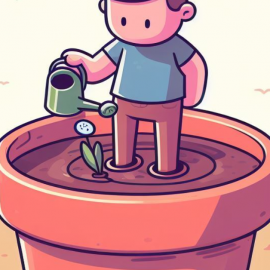

This article is an excerpt from the Shortform book guide to "The Master Guides: Understand and Overcome Anxiety" by Shortform. Shortform has the world's best summaries and analyses of books you should be reading.
Like this article? Sign up for a free trial here.
What should you do when you start to get anxious? How can you regain control when stress threatens to overwhelm you?
When anxiety strikes, you have the power to prevent it from escalating. Mental health experts recommend three proven techniques that can help you manage overwhelming emotions and racing thoughts.
Keep reading to discover ways to alleviate stress and anxiety by engaging your body and mind.
Alleviate Stress and Anxiety
Although preempting triggers can curb anxiety, you might not be able to avoid it entirely. If anxiety does strike, you can prevent it from escalating by taking control of your thoughts and emotions. Experts suggest three ways to alleviate stress and anxiety: Release pent-up energy, engage your senses, and replace stress-inducing habits with mindfulness.
Method #1: Release Pent-Up Energy
According to Burnout by Amelia Nagoski and Emily Nagoski, releasing pent-up energy—for example, by engaging in physical activity that gets your heart rate up—is an effective way to alleviate anxiety and stress. This is because the most common response to stress for primal humans was to run, fight, or yell. Alternatively, you can release your energy by screaming into a pillow, having a good cry, or tensing and relaxing your muscles for a few minutes.
In Why Zebras Don’t Get Ulcers, Robert Sapolsky adds that practicing these methods provides catharsis by enabling you to vent your frustration and find relief. This helps distract you from what’s causing your anxiety and also reminds you that there’s more to life than the stress of your current situation.
Method #2: Engage Your Five Senses
In Stop Overthinking, Nick Trenton suggests another way to alleviate stress and anxiety by distracting yourself from anxious thoughts and emotions: Engage your five senses. This will put a cap on your overthinking by keeping your brain occupied and grounded in the present moment. To ground yourself with your five senses:
- Look at five things in your surroundings. For example, look at the sky and observe the texture of the clouds or how fast they’re drifting.
- Touch four things around you. Run your fingers across your desk or stroke your pet.
- Listen for three sounds. Pay attention to the sound of your breath or the hum of your air conditioner.
- Try to detect two smells. Observe the scent of your coffee or your clothes.
- Tune into one thing you can taste. You might notice the lingering taste of your breakfast.
Method #3: Replace Stress-Inducing Habits With Mindfulness
In Unwinding Anxiety, Judson Brewer offers a different approach for alleviating stress and anxiety by staying grounded in the present: Practice mindfulness. This involves paying close attention to the present moment without analyzing or judging it. He explains that anxiety and its related behaviors often become automatic, but awareness allows you to notice when you’re switching to autopilot and take conscious control of your behaviors.
Brewer argues that mindfulness is an ideal replacement behavior for any harmful stress-relief habits you may have picked up because:
- It’s always available. You can be mindful regardless of your circumstances, location, or resources. You don’t need any particular item, substance, or environment to practice mindfulness.
- It’s inherently rewarding. Mindfulness feels good and its reward value never fades—unlike with substances, where over time you need more to enjoy the same effect. Mindfulness also promotes other positive feelings such as openness, creativity, and joy that are also rewarding.
- It breaks the cycle of anxiety. Many stress-relief habits (like drinking or fear-based avoidance) add to your anxiety and stress. In contrast, mindfulness has no such side effects. It doesn’t cause harm, doesn’t fuel unhealthy habits, and disrupts rather than reinforces the anxiety cycle.

———End of Preview———
Like what you just read? Read the rest of the world's best book summary and analysis of Shortform's "The Master Guides: Understand and Overcome Anxiety" at Shortform.
Here's what you'll find in our full The Master Guides: Understand and Overcome Anxiety summary:
- A compilation of research and methods from a range of experts on anxiety
- A look at what causes anxiety and how it affects your physical and mental health
- Five actionable strategies for breaking the cycle of anxious tendencies






